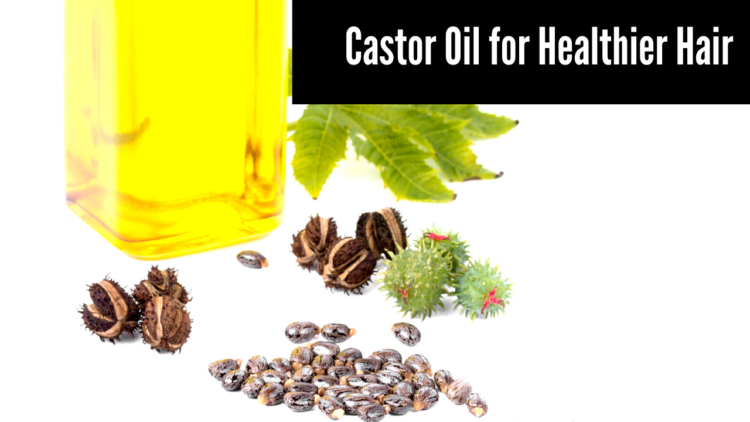Hair oils are incredibly popular these days and castor oil specifically is one of the most commonly used oils right now. Many people believe castor oil to have countless benefits such as increased hair growth, thicker and stronger hair, and that it can even make your hair darker.
In this article, I’m going to take a closer look at castor oil benefits and try to find out whether it can really help with hair growth and thickness. Continue reading or jump straight to the sections about hair growth, hair darkening and other castor oil benefits or how to apply castor oil.
What is Castor Oil?
Castor oil is a very thick vegetable oil that is extracted from castor beans (which are not real beans, actually) that are part of a plant that grows in India, China and parts of Brazil. This oil is used in a variety of industries and is known for its anti-inflammatory, antibacterial and laxative effects. That’s right, I said laxative, as in it can cause digestive problems, diarrhea and nausea in some individuals (but only when used in very large amounts or ingested). Castor oil has a very low molecular mass which allows it to penetrate deep into the skin.
The American Cancer Society notes that castor oil should never be used by women who are pregnant or suffer from chronic digestive problems. Under normal conditions castor oil is considered to be completely safe and should not cause any issues.
Castor Oil for Hair
Castor oil, just like many other oils, is often used as a leave in scalp and hair treatment. Just like with coconut oil, not all types of hair and scalp like castor oil and the only way to find out whether it will work well for you is to give it a shot. Let’s look at some of the benefits of using castor oil for hair.
Castor oil for hair growth: While many articles online claim that using this oil regularly can help to speed up normal hair growth and even spur new hair growth, there is no scientific evidence whatsoever showing that castor oil has a direct influence on how fast hair grows. This doesn’t mean that using castor oil to help with hair regrowth is pointless, though.
Now, a lot of times slow hair growth happens due to issues with the scalp or the fact that hair strands grow weak and break off early. Another common factor is improper use of hair care products or bad hair care in general. Since castor oil has antibacterial and anti-inflammatory properties, applying it to your scalp can help treat dandruff, flaky scalp, dryness, and itchiness. There are no guarantees that it will work for you though, but it is definitely worth trying, especially with so many people reporting amazing results when using castor oil.
Another (indirect) reason why using castor can help with hair growth is improved blood circulation in the scalp due to stimulation with fingers when applying the oil. It is well known that scalp massages are good for hair health and the process of applying castor oil (or any oil for that matter) to the scalp is like a mini-massage.
Castor oil for hair darkening: Some people say that using castor oil can make hair darker. While there is no scientific evidence of this, I have actually seen this happen (although the effect was very small and temporary) so there’s definitely something to it. Most experts believe that since castor oil is extremely thick, it actually coats the hair and makes it look slightly thicker and darker than usual. This effect is temporary, because natural hair color is not changed. So, if you have blond or light colored hair, keep this in mind when using castor oil. And again remember that the darkening effect is very, very mild and might not really be noticeable at all in some cases.
Castor oil for thicker eyebrows/eyelashes:
This oil is commonly used to make eyelashes appear thicker and grow longer. While I don’t believe that it can actually make eyebrows/eyelashes grow faster or longer, it can definitely add some (temporary) thickness and make them look darker and “fuller”. Some beauty experts say that castor oil used on eyebrows kills off bacteria that hinders hair growth and can actually help increase length and stop shedding.
Do note that castor oil should not be allowed to get into your eyes! Use very little oil and apply it carefully.
Castor oil for hair shedding and itchy scalp: Some people say that castor oil stops hair shedding and can cure various conditions that cause itchy scalp and dry, flaky skin. Others have tried using castor oil but had to stop due to increased shedding. This just goes to show that everyone’s scalp is different and there’s no way to tell exactly how your hair/scalp is going to react to castor oil without giving it a try.
How to Use Castor Oil On Hair
The process of applying castor oil to scalp/hair is very simple. Do remember that most people use it as a leave in treatment for scalp and hair strands. Castor oil is rarely applied to hair length/ends. Here are some tips to get your started:
- Castor oil is very thick. Applying it undiluted can be problematic – you should either get your scalp/hair wet before using the oil or mix (50/50) castor oil together with a different oil such as coconut, avocado or almond. This will make it easier to spread the oil out nicely and should help to prevent buildup.
- Castor oil doesn’t smell nice. Add a few drops of rosemary, peppermint or a similar essential oil to help with the smell.
- Use very little oil. When applying castor oil to your scalp you should avoid overuse to prevent having to deal with greasy hair afterwards. Plus, if you put too much of it on your head, it can be very difficult to wash out!
- Spread it evenly. While many people like to use a dropper bottle to drop oil directly onto the scalp, I prefer using my fingers instead. Put your castor oil mix into a small bowl, dip your fingers in the oil and then apply it gently to your scalp. This may not seem like a big deal, but it does help to reduce problems with greasy/oily hair post-treatment.
- Warm it up. If the oil feels extremely thick you can warm it up a little to make it more fluid. Don’t microwave it though – fill up a bowl with hot water, then add a smaller bowl with some castor oil into it and wait 2-4 minutes.
- Shampoo or conditioner? If you find that your regular shampoo just doesn’t get all of the oil out of your head, try using a conditioner instead (and skip the shampoo). Apply some conditioner to your head/hair, wait for 10-20 minutes and then wash it out.
- How long? Leave the oil in for at least 30 minutes and then wash it out. Some people like to leave castor oil in overnight which is also fine. I don’t think that going any longer than 2-3 hours has any added benefit, but choose whatever method is the most convenient for you.
- How often? Just 1-2 treatments per week should be enough to see good results. Give it about four weeks and if you aren’t seeing an improvement in how your scalp/hair feels – try something different.
As you can see, castor oil is a superb scalp treatment that you should try at least once, especially if you have problems with itching, dry scalp and shedding. Just remember this:
- Dilute the oil using coconut, almond or some other oil. Use very little oil.
- Add several drops of your favorite essential oil (rosemary, peppermint) to make it smell better.
- Warm it up a little (don’t microwave!).
- Apply it evenly to your scalp and leave in for at least 30 minutes.
- If shampooing doesn’t get it all out try using a simple, cone-free conditioner instead.
That’s it! Let us know how it goes and feel free to ask questions in the comments below.



Comments are closed.